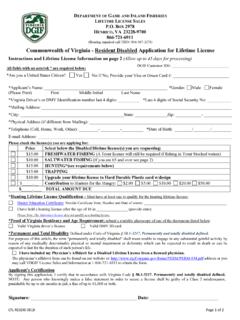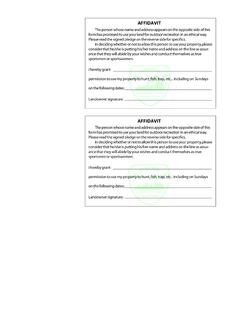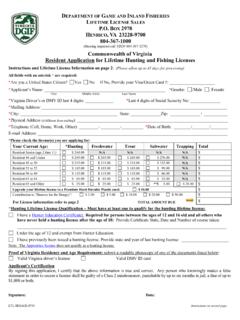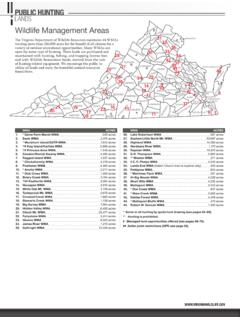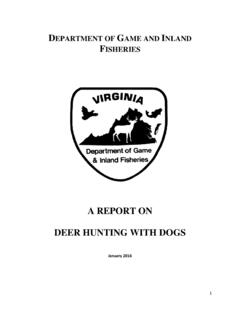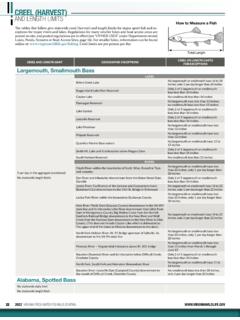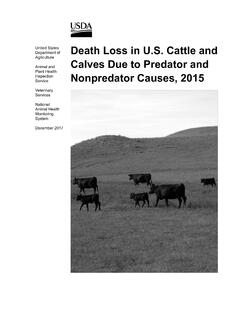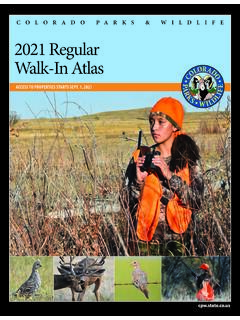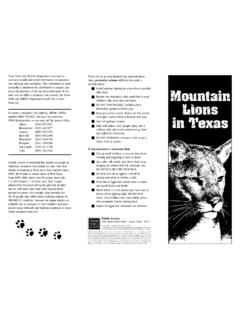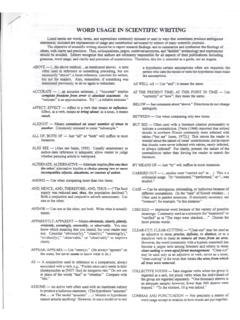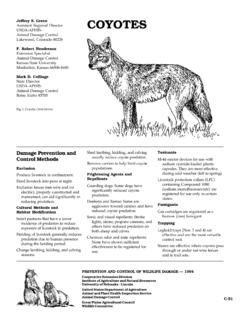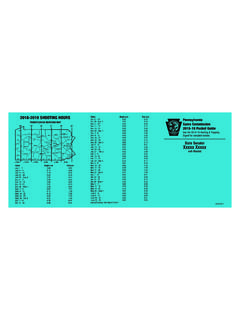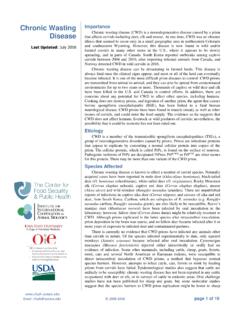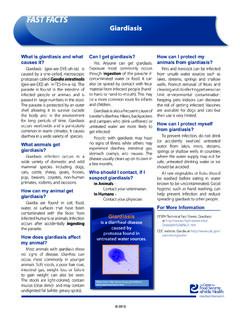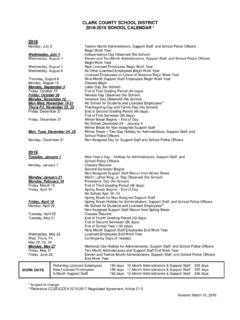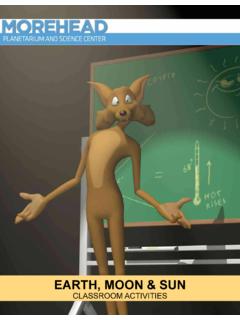Transcription of Virginia Wildlife Rehabilitation Permit Conditions
1 1 04/04/22 Virginia DEPARTMENT OF Wildlife RESOURCES Box 3337 Henrico, Va. 23228-3337 Wildlife Rehabilitation Permit Conditions I. OVERVIEW ..1 II. Permit PROCESS ..1 Rehabilitator Categories ..2 III. Conditions APPLICABLE TO ALL REHABILITATORS ..8 A. Definitions ..8 B. General Conditions ..8 C. Wildlife Care Conditions ..9 D. Restricted Species Conditions ..11 E. Disease Transmission Risk Reduction Conditions ..11 F. Final Disposition Conditions ..16 G. Administrative Conditions ..18 H. Renewal Conditions ..19 I. Federal, State, and Local Laws ..20 J. Cancellation, Suspension and Revocation ..20 K. Wildlife Rehabilitator Code of Ethics ..20 APPENDIX A BASIC REQUIREMENTS FOR HOUSING WILD ANIMALS ..22 APPENDIX B MINIMUM HOUSING GUIDELINES FOR SONGBIRDS & MISCELLANEOUS AVIAN SPECIES ..25 APPENDIX C MINIMUM HOUSING GUIDELINES FOR WATER BIRDS ..28 APPENDIX D MINIMUM HOUSING GUIDELINES FOR RAPTORS ..30 APPENDIX E MINIMUM HOUSING GUIDELINES FOR SELECTED MAMMALS.
2 32 APPENDIX F MINIMUM HOUSING GUIDELINES FOR REPTILES ..35 SAMPLE RABIES COMMUNICATION FORM ..37 SAMPLE ADMISSION FORM FOR HIGHEST-RISK RABIES VECTOR SPECIES ..38 ANNUAL Rehabilitation REPORT SUMMARY ..40 I. OVERVIEW All persons caring for sick, injured, orphaned, or debilitated Wildlife are required to have a Permit from the Virginia Department of Wildlife Resources (VDWR). The goal of the permittee is to return s u c c e s s f u l l y r e h a b i l i t a t e d w i l d l i f e to their natural habitat, as quickly as possible, providing them with a reasonable chance to function and behave normally within their population and ecosystem. Licensed veterinarians providing medical care to sick, injured, or debilitated Wildlife are not required to have a Permit from VDWR. Non-permitted licensed veterinarians may hold Wildlife until patients are medically stable. Once stable, Wildlife patients must be transferred to a permitted Wildlife rehabilitator.
3 Licensed veterinarians rehabilitating healthy or recovered Wildlife for release back to their natural habitat are required to have a Wildlife rehabilitator Permit . II. Permit PROCESS Individuals with interest in becoming Wildlife rehabilitators are directed to the Wildlife Rehabilitator Permit application and Permit Conditions located on the VDWR website where the types of permits and processes are detailed. Applicants may forward their completed applications with the non-refundable fee to the VDWR Permits Section address listed above. Received applications will be reviewed for completeness by VDWR Permits Section Staff; incomplete applications may require staff to contact applicants for additional information, thereby delaying Permit issuance. Rehabilitators 2 04/04/22 caring for Wildlife in their homes or their own designated facilities are required to have a pre-inspection of their home or designated facilities scheduled by VDWR Permits Section staff and completed by a VDWR Conservation Police Officer (CPO).
4 (Note: Permits that have lapsed for a year or more are required to have a new CPO pre-inspection prior to re-issuance.) Applicants should allow thirty (30) days for the issuance of all permits. Category I, II, or III Wildlife rehabilitators must be at least eighteen (18) years of age, a resident of the Commonwealth of Virginia (unless a student of an accredited institution of higher learning [college or university] and possessing a temporary Virginia residential address), and not have been previously convicted of violating any Federal, State or local law or ordinance relating to Wildlife . Category IV or V Wildlife rehabilitators must be at least sixteen (16) years of age, a resident of the Commonwealth of Virginia , not have been previously convicted of violating any Federal, State or local law or ordinance relating to Wildlife , and have their application co-signed by a legal custodian. Those (Category I-III rehabilitators) wishing to rehabilitate migratory birds or waterfowl must possess a Fish & Wildlife Service (USFWS) Federal Wildlife Rehabilitation Permit , or be authorized (as a sub-permittee, in writing [for Category IV and V rehabilitators and Category IIIA sub-permittees]) by a rehabilitator who possesses a Federal Permit , and have their facilities approved by USFWS.
5 A. Rehabilitator Categories Wildlife Rehabilitation Permits are issued in five (5) categories and are defined as follows: Category I (Apprentice) Permit is for an individual with entry level skills who has less than two (2) years of Rehabilitation experience. Category I permittees must be sponsored by an active Category II or Category III permittee and a p p l i c a n t s are h i g h l y e n c o u r a g e d to s e r v e as a C a t e g o r y IV r e h a b i l i t a t o r for a m i n i m u m of six (6) m o n t h s at t h e i r p r o s p e c t i v e Sponsor s f a c i l i ty b e f o r e t r a n s i t i o n i n g to a Ca t e g o ry I p e r m i t t e e . Applicants must provide evidence of completion of at least six (6) hours of approved continuing education prior to submitting an application to become a Category I permittee. His/her work is performed under the supervision and guidance of the sponsoring Category II or Category III permittee and is generally limited to uninjured or orphaned Wildlife .
6 A Category I permittee must satisfy annual educational requirements as well as successfully complete fifty (50) hours per year of hands-on training/work experience under the supervision and guidance of their Sponsor or other Category II or III permittee. Documentation (maintained by the Apprentice and subject to review by the Sponsor or VDWR) should include a log of each training/work experience date, topics/skills covered, number of hours, and the supervising permittee s name. The details of the training, including number of hours per training period, will be coordinated between the Sponsor and the Apprentice, although at least four (4) hours per month is recommended. As Wildlife Rehabilitation is seasonal it is extremel y important that the Apprentice be exposed to a complete calendar year of Rehabilitation ex perience. This Permit requires a facility inspection by a representative of VDWR. If the facility is going to be rehabilitatin g highest-risk rabies vector species (RVS) then proof of either a complete rabies vaccine series administere d within the last two (2) years or an adequate rabies titer performed within the last two (2) years (pursuant to the Virginia D e pa rt me nt of Health s Virginia Guidelines for Rabies Prevention and Control) is required.
7 For Category I permittees to be allowed to rehabilitate migratory birds and/or waterfowl they must apply for and obtain a Fish & Wildlife Service (Federal) Wildlife Rehabilitator Permit . Category I permittees may not rehabilitate federally protected migratory birds without a Federal Permit in their name. 3 04/04/22 Category I permittees: 1. May provide basic care ( , food, shelter, warmth, water) for uninjured, orphaned Wildlife (except raptors, predatory animals, or animals requiring unusual expertise or facilities). 2. May not administer Controlled Substances to Wildlife unless under the direct supervision of a licensed veterinarian or permitted Category II or III Wildlife rehabilitator. 3. May receive, transport (see #24 under general Conditions ), and house (for not more than twenty four [24] hours) injured Wildlife or orphaned species not authorized under the Category I Permit (except bald and golden eagles, threatened or endangered species, black bears, coyotes, adult white-tailed deer, elk, mute swans, feral swine, or other nuisance species as defined in 4 VAC 15-20-160 of the Virginia Administrative Code, with the exception of woodchucks), providing they have received authorization and necessary instruction, in advance, from sponsoring Category II or Category III permittee, cooperating veterinarian, agent of the VDWR, or other individual designated by the VDWR.
8 4. A Category I permittee shall not solicit contact with the public regarding direct acceptance of Wildlife from the community except upon referral by their sponsoring Category II or Category III permittee, or designees of the VDWR. Category I permittees who receive animals must notify their Category II or III sponsor within twelve (12) hours of directly receiving animals. 5. Must maintain and provide, as required, a full record of each animal received which should include, at minimum, date of submission, contact information for rescuers and/or others who handled the animal prior to receipt by the rehabilitator, reason for submission, final disposition ( , died in cage, euthanized, released), date of disposition, and location of release (if applicable). A copy of all records must be provided to the sponsoring rehabilitator. Category IIA (Individual) or Category IIB (Organization) Permit is for those with advanced skills who have more than two (2) years of Rehabilitation (as a Category I rehabilitator), or equivalent, Wildlife care experience.
9 Applicants must provide evidence of completion of at least six (6) hours of approved continuing education prior to submitting an application to become a Category II permittee and must satisfy annual educational requirements. They must work in cooperation with a licensed veterinarian and may provide care for all Wildlife (except bald and golden eagles, black bears, coyotes, adult white-tailed deer, elk, mute swans, feral swine, or other nuisance species as defined in 4 VAC 15-20-160 of the Virginia Administrative Code, with the exception of woodchucks), providing that their animal holding facilities meet standard requirements, have passed inspection by VDWR, and they have documentation of either receiving a complete r a bi es vaccine series administer ed within the last two (2) years or possessing an ade quate ra bi e s titer performed within the last two years, if necessary. Individuals providing care to raptors or animals requiring unusual expertise would need to have advanced skills and provide proof that they have met the requirements necessary for the level of care they are providing.
10 Category IIA (Individual) is an individual meeting all of the Category II criteria. Category IIB (Organization) is an incorporated and insured organization meeting the Category II criteria. Category II permittees: 1. May provide basic care ( , food, shelter, warmth, water) for sick, injured, debilitated, and/or orphaned Wildlife . 4 04/04/22 2. May receive, transport, and house (for not more than 24 hours) injured Wildlife or orphaned species not authorized under the Category II Permit (except bald and golden eagles, black bears, coyotes, adult white-tailed deer, elk, mute swans, feral swine, or other nuisance species), providing they have received authorization and necessary instruction, in advance, from cooperating veterinarian, agent of the VDWR, or other individual designated by the VDWR. 3. May receive, transport, and hold sick, injured, orphaned, or debilitated Wildlife (bald and golden eagles will be transported to a Category III facility, or other approved facility designated by U.)

